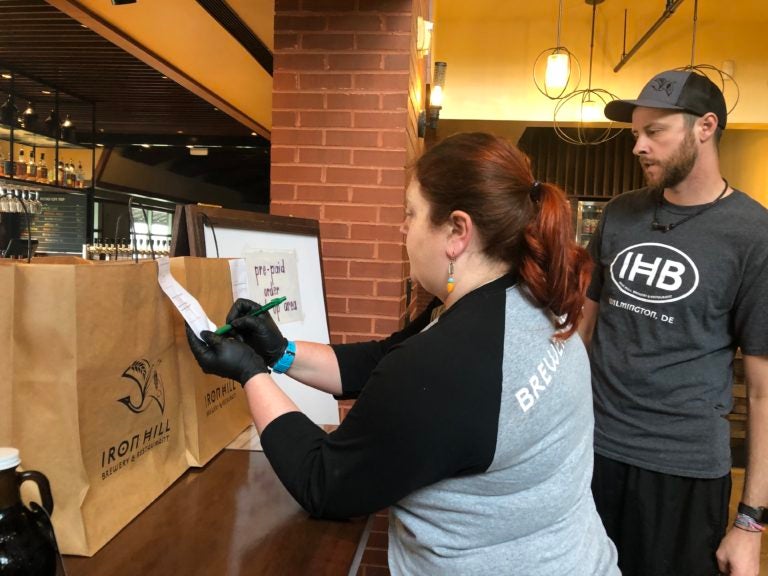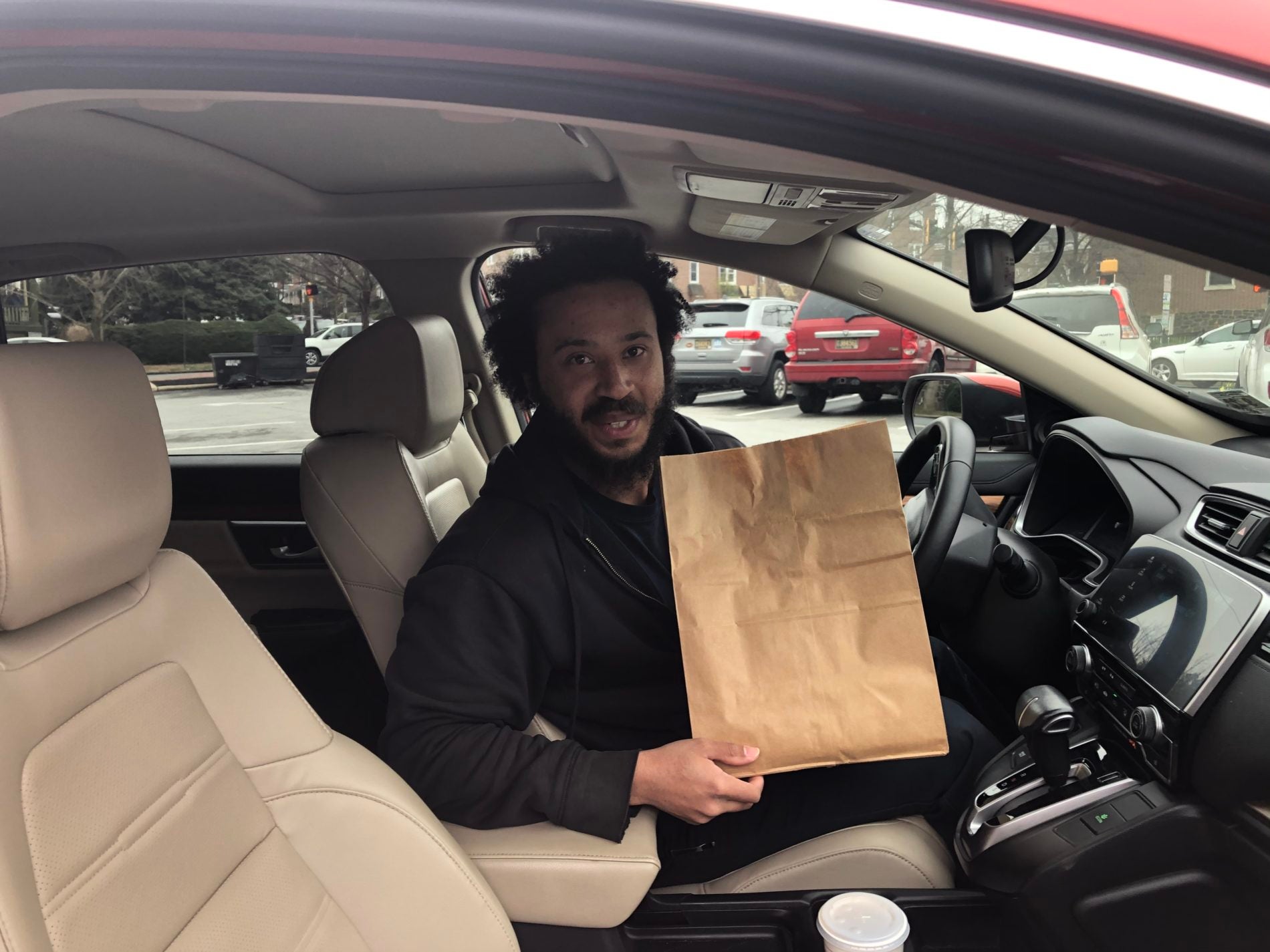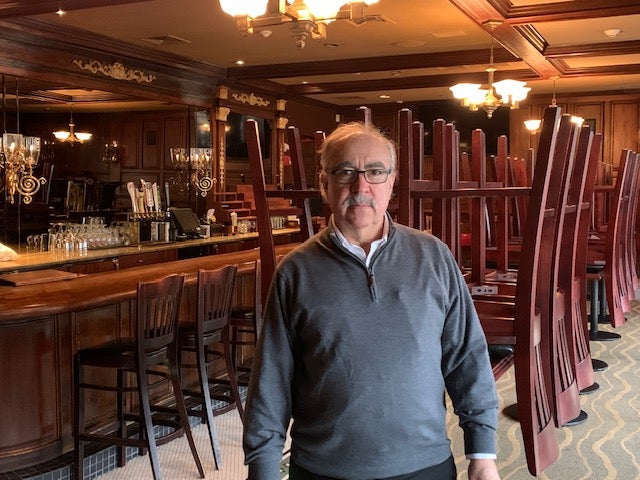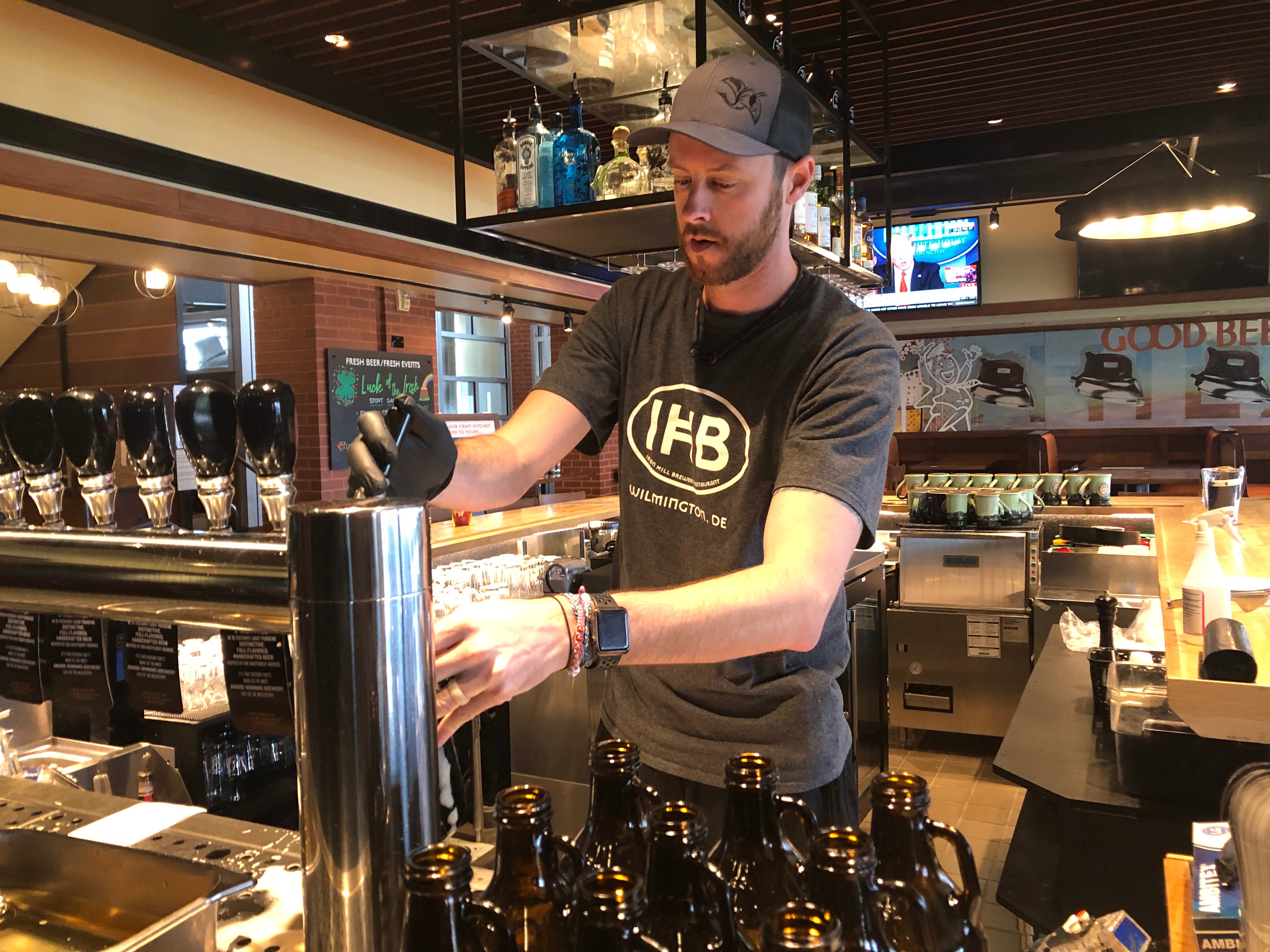Ban on dine-in service has Del. eateries struggling with ‘uncertainty’ during pandemic
Gov. Carney is limiting restaurants to take-out and delivery service for the time being. Many are closing completely, but some are open with skeleton crews.

Moriah Guise and Dustin Mitchell check orders at Iron Hill Brewery. (Cris Barrish/WHYY)
Auto technician Isaac Moore’s go-to spot for lunch is El Diablo in Wilmington’s Trolley Square, where he likes to unwind with a beef burrito bowl.
Not anymore, at least not as long as the coronavirus crisis continues to expand. As of Friday morning, Delaware had 38 confirmed cases.
“I usually sit in there and eat and just kind of relax and enjoy it, but obviously with the situation, this is my only option,’’ Moore said from his SUV after grabbing a take-out order.
Moore said Gov. John Carney made the right call this week by banning dining inside restaurants and limiting them to take-out and delivery service.
“It’s what it is,’’ he said. “I understand it’s a public safety thing and it’s just reducing the exposure. I’m not happy about it because I like to get out of work and kind of enjoy my time, get some air.”

While Moore can pick up meals or have them delivered, the restaurants who provide them are struggling for their very survival, with servers and much of the kitchen staff laid off.
Xavier Teixido, who runs two thriving restaurants and has chaired the National Restaurant Association and the Delaware Restaurant Association, said the pandemic and the indefinite ban on dine-in service is a devastating blow to the industry.
“We’re just trying to figure it out,’’ said Teixido, who owns Kid Shelleen’s Charcoal House & Saloon in Wilmington and Harry’s Savoy Grill in Brandywine Hundred. “It’s the duration that’s the most painful part, and we have this uncertainty.”

The parking lot that Big Fish Grill and Iron Hill Brewery share on the Wilmington Riverfront is normally packed for lunch and dinner.
But Big Fish has closed down completely, like dozens of other restaurants around the state.
Iron Hill was offering takeout, including growlers and four-packs of their beer, and food-only delivery, per Carney’s order.
Moriah Guise packaged orders as part of a skeleton crew, with a few guys cooking. “I’m actually the brewer,” said Guise, but “we’re all multitasking right now.”
General manager Dustin Mitchell, who filled up a long line of growler bottles on the bar while overseeing orders in the kitchen, said Iron Hill usually sees $3,000 to $4,000 in revenue at lunchtime, but now it’s only a fraction.
“We’re here,’’ Mitchell said. “We want to help and support in any way. I’m sure the people are going to get stir crazy and walk on the Riverwalk.”

Amtrak employees Maxin Dhanawade, Quin McRae and Sue McNamee had planned to celebrate McNamee’s birthday with lunch at Iron Hill.
Instead, they grabbed some take-out sliders, wings and salads to eat in an office conference room “six feet apart,’’ Dhanawade said.
“We’re trying to promote the local businesses,’’ she added. “It’s Sue’s favorite. That’s why we came in today.”
McRae lauded Iron Hill for staying open, albeit in a limited state.
“I think this is great to be available here. But we’re in a place that’s weird. We really don’t understand what’s going on and how long it’s going to last,” McRae said. “So it’s a tough situation.”
Teixido said only 20 of his 160 employees are still working this week, and the rest are seeking unemployment compensation. Even though take-out is a minuscule part of the restaurants’ business, they are still offering the service to have some continuity of operations.
The governor has made it easier to get unemployment compensation and the state is offering no-interest loans to restaurants and other businesses in the hospitality industry. Teixido said that can alleviate the pain for small restaurant operations and is hoping for help from the federal government for bigger ones like his.
The bottom line, he said, is that the crisis will devastate the industry and the people who make their livelihood preparing and serving food and drinks.
“Everybody is going to struggle right now with liquidity,” Teixido said. “Our [employees] aren’t going to have enough money and businesses won’t have enough money. And they both have enormous bills. I think what you are really seeing right now is something that’s kind of extraordinary … You don’t know what you’ve got ‘til it’s gone.”
Teixido is also concerned about what will happen once the ban is lifted.
“Will people be averse to crowds forever?” he said. “I think it’s going to take a long time for us to normalize our behaviors and the expectations of people … around distancing and sanitation and procedures.”
WHYY is your source for fact-based, in-depth journalism and information. As a nonprofit organization, we rely on financial support from readers like you. Please give today.




![CoronavirusPandemic_1024x512[1]](https://whyy.org/wp-content/uploads/2020/03/CoronavirusPandemic_1024x5121-300x150.jpg)


